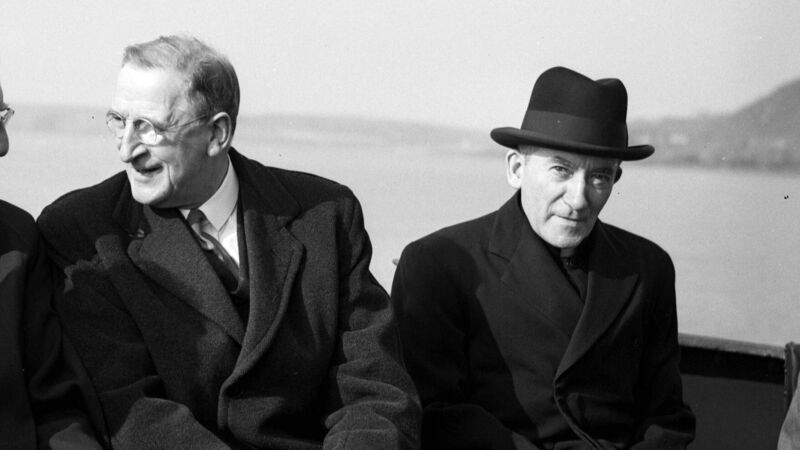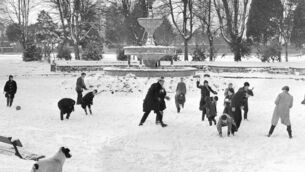Pivotal events 50 years ago that ushered in our modern Ireland

Éamon de Valera and Archbishop John Charles McQuaid in Cobh in 1953. The Archbishop died 50 years ago yesterday, in 1973, Dev quit politics soon after.
FIFTY years ago today, Ireland woke up to some news that shifted the country’s social landscape on its axis.
Archbishop John Charles McQuaid, the Roman Catholic who had played a bigger role than anyone else to keep Church and State in lock-step for half a century, was dead.
Aged 77, and having retired as Catholic Primate of Ireland just over a year before, his death was hardly a shock, and his passing on the morning of April 7, 1973, only just made the front page of that day’s Evening Echo.
In its leader the following Monday, the Cork Examiner came close to committing that cardinal Irish sin of criticising the dead, when it said “it would be foolish to pretend Archbishop McQuaid’s time was not marked by some measure of controversy”.
But, cognisant perhaps that the Ireland of 1973 was still deeply Catholic and church-going, the leader concluded that the holy man was worthy of “greatness”.
That was certainly an opinion shared by the other fading pillar of the old guard that had steered Ireland through the first 50 years of its existence. Then President, Éamon de Valera was said to be “deeply grieved” to hear of the death of his long-time friend and, in the privacy of Loughlinstown Hospital, he wept over the lifeless body of Archbishop McQuaid.
Within weeks, Dev himself would depart the stage when he announced his retirement from politics aged 90.
Just a week before his friend McQuaid’s death, Dev had come to Cork to receive the Freedom of the City, but now his own remarkable long sphere of influence was drawing to an end.
In the space of just a few weeks, the two men who had together moulded and influenced Ireland to such a large degree were gone. There is a remarkable symmetry to the timing.
If you take the beginning of Ireland’s nationhood as the end of the Civil War, on May 24, 1923, then the passing and retirement of Archbishop McQuaid and de Valera took place almost exactly 50 years later.
Now, here we are, 100 years on from the Civil War, and 50 years since the politician and the priest left the stage, and contemplating how much this country has changed since 1973... and how much more it might change between now and 2073!
******
The extent to which Éamon de Valera and Archbishop McQuaid moulded, shaped and influenced Ireland from the 1930s to the ’60s, both separately and together, will long be debated and disputed.
What we know for sure is that their links went back a long way.
de Valera attended Blackrock College in the early years of the 20th century, where McQuaid was principal between 1931 and 1939, and his sons were attending the college at the time of the drafting of the Constitution, over which many of their critics contend McQuaid had an unhealthy say.
Dev and McQuaid shared a sad connection in that neither knew their mother.
McQuaid’s had died of medical complications a week after giving birth to him, and only in his teenage years did he learn his stepmother was not his biological mother.
de Valera never knew his own mother as she sent him to Ireland from the U.S. when he was two. In later life, he would remember occasional visits from a “woman in black”, who he had thought might have been his mother.
Psychologists would have a field day assessing whether this lack of a mother figure fed into the two men’s life-long attitudes to women, as summed up by the Constitution’s call for their place to be in the home. Equally, it could be argued they were merely men of their time and were in fact pointing to the vital role mothers actually played in raising families - a burden both men would have felt acutely.
However, it’s impossible to overlook the stern and malign influence Archbishop McQuaid, in particular, had on Irish life - an influence that dragged Ireland back at a time when it should have been throwing off the yoke of centuries of English rule.
While President of Blackrock College, he led a crusade to deny young women the right to play sports at the same time and in the same places as men. He also effectively controlled the censorship bodies for books and films.
Once, referring to the French Revolution’s Declaration of the Rights of Man, MacQuaid railed: “Modern newspapers and cinemas are the direct outcome of this virulent document which, after the manner of Satan, sets man in the place of God.”
Providing concrete evidence off his desire to impinge on all areas of Irish life - not just the spiritual - the Archbishop said: “Priests must interfere in politics by Divine Right, to guide the faithful.”
And interfere McQuaid most certainly did. A dire example came in 1944 when he complained to the Minister for Health about the sale of a new sanitary item, Tampax, because “young girls could be stimulated... which would lead them to display their passions”.
This bizarre and ludicrously unscientific reasoning won the day and the government duly banned Tampax.
However, McQuaid and Dev will forever be associated with the drafting of the 1937 Constitution, in particular those long-offensive clauses about “the inadequate strength of women” and the fact they belonged in the home.
The wording was seen as old-fashioned even in its time.
Irish Independent columnist Gertrude Gaffney wrote: “The death knell of the working woman is sounded in this new Constitution. Mr de Valera has always been a reactionary where women are concerned. He dislikes and distrusts us as a sex and his aim ever since he came into office has been to put us into what he considers is our place and keep us there.”
Under the proposed constitution, Gaffney argued, “we are no longer citizens entitled to enjoy equal rights under a democratic constitution”. Only now is the government getting around to deleting these offending lines, putting it to the public vote in a referendum in November when they are expected to be consigned to the dustbin of history.
The Constitution also included a ban on divorce and abortion and would have included a ban on contraception devices, if a law had not already been passed in 1935.
Many claim the fingerprints of McQuaid are all over these areas, although others, such as the late Cork historian John A Murphy felt Dev, “though a devout son of the Church, had a fine sense of church-state distinction”.
Another victory for McQuaid was the line in the Constitution about the ‘special position’ of the Catholic Church. That remained for almost 40 years before being removed in a referendum... in 1973 - just a few months before the Archbishop breathed his last.







 App?
App?




